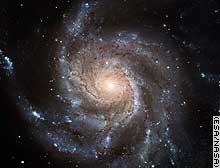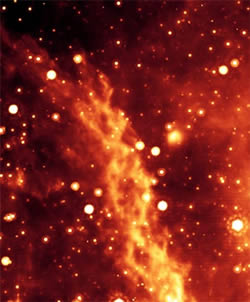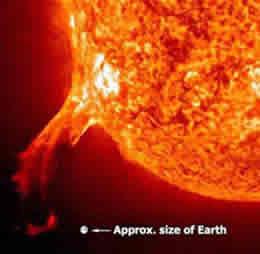The Starry Heavens Above:
Robust Faith and Rigorous Science
For Sunday September 17, 2006
Lectionary Readings (Revised Common Lectionary, Year B)
Proverbs 1:20–33 or Isaiah 50:4–9
Psalm 19 or Wisdom of Solomon 7:26–8:1 or Psalm 116:1–9
James 3:1–12
Mark 8:27–38
 |
Summer solstice at Stonehenge. |
Pluto's demotion to a "dwarf planet" by the International Astronomical Union, and the good-natured protests that followed, remind us of humanity's perennial fascination with what Kant called "the starry heavens above." A few years ago my wife and I visited Stonehenge, where 5,000 years ago architect-astronomers hoisted massive boulders into a circle based upon their knowledge, before they ever started construction, of the summer solstice and how the sun's rays would strike their site at a precise time and place. About that same time, star-gazers in Egypt noticed how one morning every year, just before the Nile flooded, Sirius lined up with the sunrise, and so they designated that day the first day of their calendar year.
I count myself as one of those who resonate with King David's psalm for this week: "The heavens declare the glory of God; the skies proclaim the work of his hands. Day after day they pour forth speech; night after night they display knowledge." (Psalm 19:1,2). I still remember a chilly October night in remote Siberia near Lake Baikal, and an evening on the outskirts of Nairobi, when the ink-black sky was so densely populated with blazing stars that I felt like I could reach up and touch them. The immensity and grandeur of the galaxy those two nights made me feel insignificant by comparison, but I also somehow felt at home in the cosmos, as if those stars signaled a larger Love who cared for me.
Not everyone draws those conclusions from science's "book of nature." In her book The Sacred Depths of Nature the eminent cell biologist Ursula Goodenough recalls a camping trip when she was about twenty years old: "I found myself in a sleeping bag looking up into the crisp Colorado night. Before I could look around for Orion or the Big Dipper, I was overwhelmed with terror. The panic became so acute that I had to roll over and bury my face in my pillow. . . When I later encountered the famous quote from physicist Steven Weinberg—'The more the universe seems comprehensible, the more it seems pointless'—I wallowed in its poignant nihilism. A bleak emptiness overtook me whenever I thought about what was really going on out in the cosmos or deep in the atom."
If the only evidence that a person had was the book of nature, our scientific knowledge of our universe with its 100 billion galaxies, each one containing 100 billion stars, what conclusions might one reasonably make about the existence of God? Whose wisdom would prevail, that of King David or Ursula Goodenough?
 |
Hubble photograph of the Pinwheel Galaxy. |
Some scientists opt for atheism (eg, Weinberg, Carl Sagan, or Richard Dawkins), but the empirical evidence alone does not necessitate that gloomy position. Elsewhere in her book Goodenough tries to "sweeten the sour apple" by embracing what she calls a non-theistic religious naturalism. Others like Albert Einstein (1879–1955) appeal to Cosmic Awe. Einstein was decidedly irreligious in the sense that he spurned all institutional affiliations, never attended worship services or prayed, rejected all dogmatic theology (eg, miracles, the afterlife, or prayer), did not believe that God was in any sense personal, and was a strict determinist. But he found it impossible not to think of himself as religious in the sense of humility and awe at the mystery, rationality and complexity of the cosmos: "the eternal mystery of the world is its comprehensibility." For Einstein the mysterious book of nature betokened some superior intelligence: "I believe in Spinoza's God who reveals himself in the orderly harmony of what exists, not in a God who concerns himself with the fates and actions of human beings." Thus, Einstein repudiated those whom he called "the fanatical atheists" who tried to claim him for their cause. About a year before he died he wrote in a letter that he understood himself to be a "deeply religious unbeliever."
Philosophic or religious extrapolations based only upon the empirical evidence of science face strict limitations. Despite its prodigious explanatory power and the countless ways that science has benefited humanity, by itself the scientific method operates with two important constraints. First, it cannot make the epistemological claim that the scientific method is the only way of gaining valid knowledge. Science can inform and complement, but by itself it has no ability to fully address the most meaningful questions about being human—the love of a mother for her child, the beauty of a Mozart opera, the purpose of life, the meaning of death, the rational intelligibility of the world, the persistent religiosity of human beings throughout history and cultures, how to determine right and wrong, what existed before the Big Bang 14 billion years ago, or how life originated after the Big Bang. Second, science cannot make the metaphysical claim of materialism, that nature and the physical world are all there is to know; when it does that it has drawn conclusions that its data do not require and entered the realm of metaphysics or philosophy. Stated positively, the Cambridge particle physicist and Anglican priest John Polkinghorne observes that science has enjoyed immense success precisely because of “the modesty of its ambitions, by its self-limitations” to describe only the physical world.
 |
Double helix nebula. |
As a result of these two constraints, I find a narrowly scientific worldview unsatisfying both emotionally and intellectually. Given the limited purview of science, many scientists acknowledge that by itself the book of nature is insufficient for a well-rounded world view. In addition to the book of nature about God's world, Christians appeal to the books of Scripture containing God's word. The overall plot of the Christian story makes two basic claims, one stupendous and the other scandalous, that nourish a robust faith in addition to rigorous science.
The Hebrew Scriptures make the stupendous claim that the transcendent God who flung the 100 billion galaxies into space ex nihilo is like an attentive mother or tender father who cares for each and every human being, who hears our every cry for help, and who intervenes to act for our good. The alternate Psalm in the lectionary reading this week affirms exactly what Einstein denied, that God speaks and acts, he loves and he listens:
I love the LORD, for he heard my voice;
he heard my cry for mercy.Because he turned his ear to me,
I will call on him as long as I live.The cords of death entangled me,
the anguish of the grave [a] came upon me;
I was overcome by trouble and sorrow.Then I called on the name of the LORD :
"O LORD, save me!"The LORD is gracious and righteous;
our God is full of compassion.The LORD protects the simple hearted;
when I was in great need, he saved me.Be at rest once more, O my soul,
for the LORD has been good to you.For you, O LORD, have delivered my soul from death,
my eyes from tears,
my feet from stumbling,that I may walk before the LORD
in the land of the living. (Psalm 116:1–9, NIV)
The Hebrew poet stakes a claim far beyond Goodenough's impersonal mystery or Einstein's Cosmic Awe. To this stupendous claim that God deeply loves and cares for me, the Gospel for this week makes the scandalous claim that God's compassion for all creation is most fully revealed in the suffering, death, and resurrection of Jesus, and that, as a consequence, "whoever wants to save his life will lose it, but whoever loses his life for me and for the gospel will save it" (Mark 7:31–35).
 |
Solar flare. |
On June 26, 2000, the medical geneticist Francis Collins stood next to President Bill Clinton in the East Room of the White House, where together they announced to the world that the Human Genome Project had completed a first draft of all 3.1 billion letters of the DNA code. "Today," said Clinton, "we are learning the language in which God created life." As head of the project, Collins had managed over 2,000 scientists in 20 genome centers in six countries. In his new book The Language of God, Collins remembers that day in the White House as both a celebration of a stunning scientific achievement and as "an occasion of worship." Instead of scowling or staring at the floor in embarrassment because of Clinton's explicitly religious remarks, for Collins the day celebrated the best of two complementary worlds, robust faith in a generous God and rigorous science committed to understanding his world.
For further reflection:
* What accounts for the antagonism, real or perceived, between science and religion?
* What religious experiences, positive or negative, have you encountered in nature?
* The natural world is also a source of suffering (hurricanes like Katrina, congenital deformities, etc.); how does a Christian worldview account for that?
* For further study see Francis Collins, head of the Human Genome project, The Language of God; A Scientist Presents Evidence for Belief in God (2006), Finding Darwin's God (2000) by Brown University biologist Kenneth Miller, and the forthcoming books by the Harvard astronomer Owen Gingerich, God's Universe (2006), and the Oxford biologist and outspoken atheist Richard Dawkins, The God Delusion (2006).





